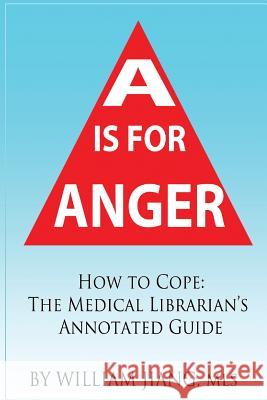A is for Anger: How to Cope- The Medical Librarian's Annotated Guide » książka
A is for Anger: How to Cope- The Medical Librarian's Annotated Guide
ISBN-13: 9781541003316 / Angielski / Miękka / 2016 / 68 str.
Anger. It is a common emotion at all ages which can run the gambit from feeling a little peeved to homicidal rage. Plato said, There are two things a person should never be angry at, what they can help, and what they cannot. Aristotle said, Anybody can become angry - that is easy, but to be angry with the right person and to the right degree and at the right time and for the right purpose, and in the right way - that is not within everybody's power and is not easy. Indeed, to feel anger is a healthy emotion. If one represses anger habitually, it is as a kettle that is being heated without allowing steam to escape. As the teapot would, the person will eventually explode with anger. However, anger can become a problem when it is unwarranted, exaggerated, or extreme. Anger is primarily a health problem that not only affects the people around the person with anger, but also they are damaging themselves, raising the risk of things like a heart attack. Also, it can damage one's social circle by putting one in less fun environments like prison or psychiatric settings. Indeed, people with intermittent explosive disorder and impulsive aggression often possess a dysfunctional connection between regions of the brain that are associated with sensory input, language processing and social interaction. Life can make one angry, as can circumstances, especially when life is viewed as "unfair." Medical conditions can aggravate this feeling of unfairness such as anxiety, bipolar, depression, schizophrenia, drug or alcohol abuse, as well as eating disorders, You may wish to check out my other book Guide to Natural Mental Health: Anxiety, Bipolar, Depression, Schizophrenia, and Digital Addiction: Nutrition, and Complementary Therapies to treat underlying issues that may be making you angry. All that being said, what can one do to lessen and prevent anger? The following annotated bibliography contains seeds of wisdom about how one can mitigate and help people who may be struggling with anger issues: from increasing potassium in the diet to reducing sodium, from natural diet and lifestyle interventions, to helpful medications such as the antidepressant SSRIs and certain antipsychotics. Librarians use annotated bibliographies in an attempts to survey the literature in a discipline, and present the information in notes which are easily understood, cutting through the medical jargon. The present annotated bibliography about anger presents the insights and work of over eighty medical researchers around the globe.
Zawartość książki może nie spełniać oczekiwań – reklamacje nie obejmują treści, która mogła nie być redakcyjnie ani merytorycznie opracowana.











